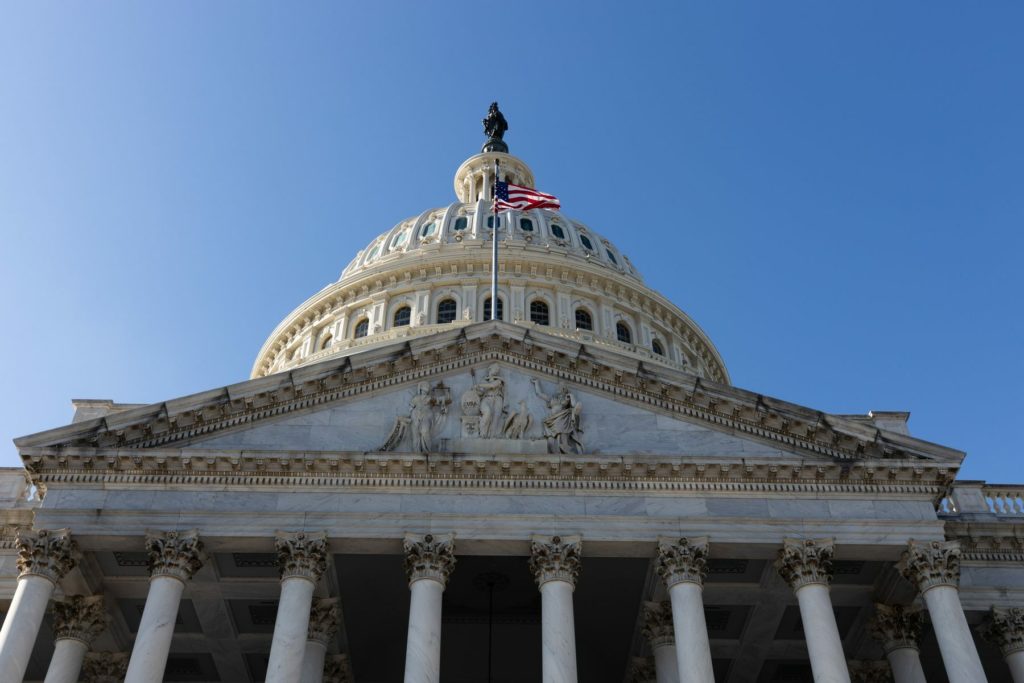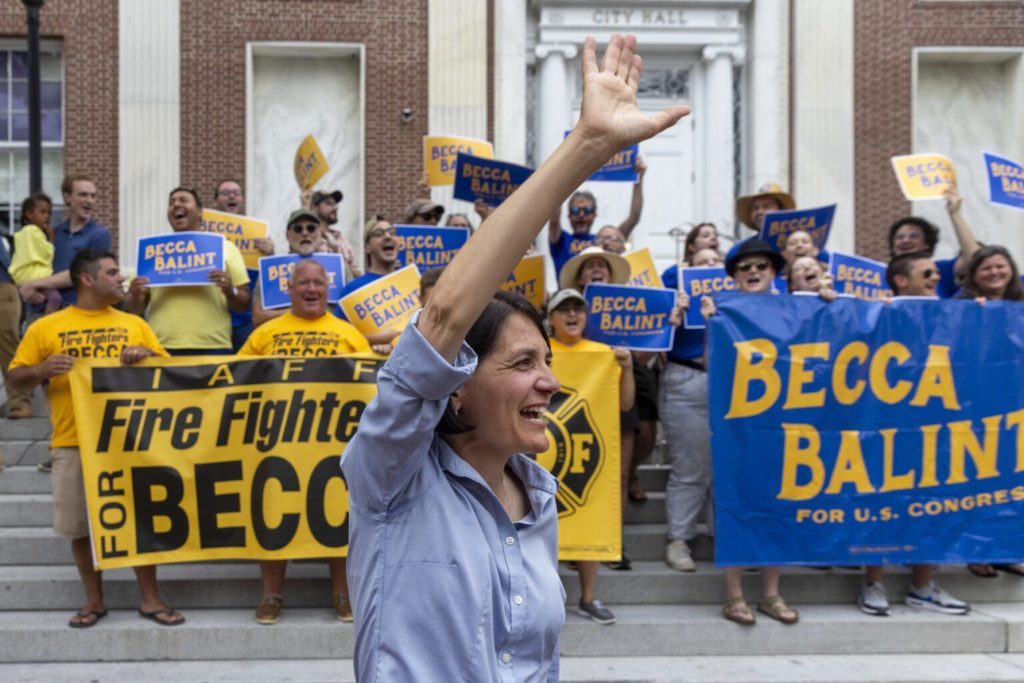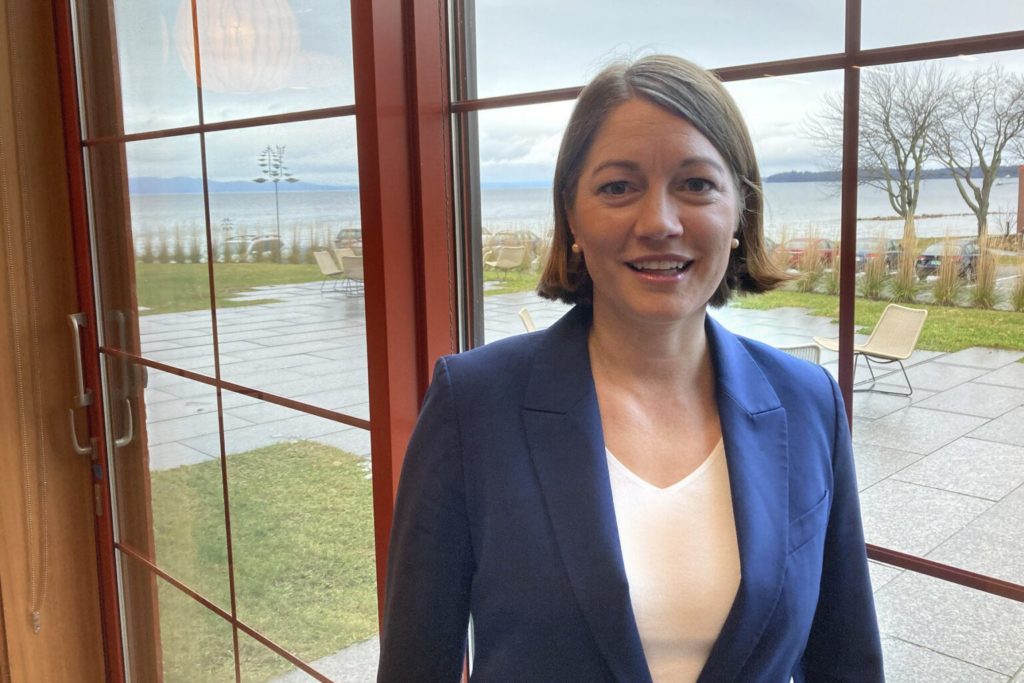A combination of factors contributed to Vermont’s distinction of having never elected a woman to Congress. Now two Democratic candidates are on the cusp of history.

The Dome of U.S. Capitol building in Washington, D.C. on January 16, 2020. (AURORA SAMPERIO/NURPHOTO VIA GETTY IMAGES)
Vermont is on the cusp of history this year as it prepares to almost certainly send a woman to Congress for the first time — the last state in the country to do so.
State Sen. Becca Balint and Lt. Gov. Molly Gray are the top Democratic contenders in the Tuesday primary for a rare open U.S. House seat, which is being vacated by Democratic Rep. Peter Welch. Welch is running for an open Senate seat after Democratic Sen. Patrick Leahy announced his retirement last year.
Republicans Ericka Redic and Anya Tynio, both women, are also running. But whoever wins the Democratic primary is favored to win in the general election, likely putting an end to a distinction that Vermont has had to itself after Missippippi elected Republican Cindy Hyde-Smith to the U.S. Senate in 2018.
“Honestly, I think it has become a source of some embarrassment,” said Elaine Haney, executive director of Emerge Vermont, a Democratic candidate training program with chapters around the country. “Vermont is actually on the vanguard of so many things. … To find ourselves last on the list of this particular statistic is disturbing to some Vermonters. It’s not a reputation we want to have. So everybody definitely has a sense of, ‘It’s about time.’”
People who follow Vermont politics closely say it’s taken so long for the state to elect a woman to Congress because the state’s Washington delegation is only three people, creating fewer opportunities for women to compete than in bigger states.
The other key factor in Vermont is that the same elected officials — all White men — have repeatedly sought reelection. Research shows incumbency helps determine reelection for a candidate in office. Welch was elected to the House in 2006 after U.S. Sen. Bernie Sanders, an independent who caucuses with Democrats, left the chamber after eight terms to run for the Senate. Leahy was first elected to the Senate in 1974.
“The incumbency advantage is enormous,” said Garrison Harrison, professor emeritus of law, politics and political behavior at the University of Vermont.
Or as Jim Dandeneau, executive director of the Vermont Democratic Party, put it: “Vermont really loves its incumbents. … That makes it hard to break through.”

Becca Balint waves to supporters at a campaign event at City Hall park, July 31, 2022. (JAMES BUCK)
Balint, 54, has leaned into her legislative experience in making her pitch to voters. She is a former middle school teacher who was elected to the statehouse in 2014 and is Senate president pro tempore, the top position in the chamber. She said despite those credentials, some potential voters, particularly men, have questioned her experience on the campaign trail.
“They’ll literally say things to me like, ‘Don’t get me wrong. I want to like you and I think I do, but I just need to know, do you know what you’re getting into?’” Balint told The 19th. “It’s like a ‘little lady’ kind of thing.”
That experience tracks with new research from the Barbara Lee Family Foundation, which released a report earlier this year that found when two women run against each other, voters demand to know why either woman is qualified.
Amanda Hunter, executive director of the foundation, said there had been an assumption that a two-woman race would cancel out some of the barriers that women face when they run against men. Instead, they still have to balance proving themselves and likability, she said. The organization is tracking several races across the country where women are running against each other, including for Congress and governor.
“I would imagine that both women have to over-communicate their accomplishments to voters in order to really stay on top of mind on why they are qualified for the position,” she said.
Gray, 38, was elected lieutenant governor in 2020 and has tried to highlight how her experience outside of elected office would be relevant to a job in Congress. She interned in Leahy’s Vermont office and worked for Welch in Washington. She also worked abroad for the International Committee of the Red Cross and as an assistant attorney general in Vermont.

Vermont Lt. Gov. Molly Gray. (AP/WILSON RING)
“There are questions every day about whether or not I have the experience to be an effective leader in Congress. The questions around experience and qualifications are still questions that women get more regularly,” she said. “My hope is that we get to the place where we really can dive into the policies of candidates. … What is their past and current experience, what makes them qualified to lead on those policy areas, rather than, ‘Can they do it?’”
Recent polling shows Balint with a 42-point lead over Gray. Balint and Gray have garnered backing from different factions within the Democratic party even as they campaign on some similar policy issues, like protecting equality rights and providing paid leave and child care access. Sanders and Democratic Sen. Elizabeth Warren of Massachusetts both endorsed Balint, with Sanders campaigning with Balint in the final days of the primary.
Madeleine Kunin, a Democrat and the first and only woman to serve as Vermont governor, has endorsed Gray. So has former Vermont Democratic Gov. Howard Dean. Leahy said he voted early for Gray.
Money has poured into the race, with each Democratic candidate raising nearly $1 million each during the cycle. Gray has criticized outside groups’ spending in the race, including more than $600,000 from LGBTQ+ and progressive political action committees in support of Balint’s candidacy.
Balint, who is gay and is Vermont’s first woman and first out leader of the state Senate, would also be the first out member of Congress to represent the state. She said that has significance for her since some people have advised her to not be as open about the life she shares with her wife and their two children.
“People who love me, and worry about me, have been wanting me to edit more of what I’m saying on the stump,” she said. “And those have been really, really hard conversations for me and my team, when we have people who love us and support us and they are concerned that Vermont is not ready for an out gay person in statewide office. And I think they’re wrong. I think Vermont is ready for it. But that’s been a little disheartening for sure.”
Gray said while the race has focused on policy issues, voters have also expressed excitement about the potential for history, especially in the final days of campaigning.
“2022 will always go down as the year where we changed the conversation and we gave women and girls across Vermont a real opportunity to see that participation is possible and that we can have a federal delegation that is representative of all of us,” she said.
Haney said the work of Emerge Vermont has been critical for ensuring that women candidates were in a position to compete for open seats for statewide and legislative office. Both Balint and Gray have completed Emerge training.
“We’re seeing a really big movement in Vermont of more and more women stepping up to run,” she said. “And my hope is that that trickles down to the local level … because that is where the bench starts.”